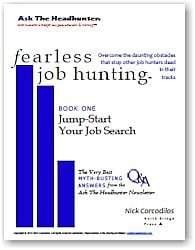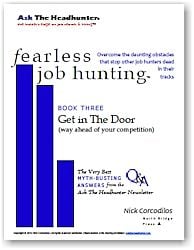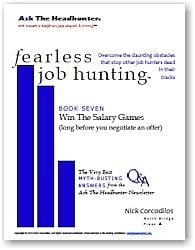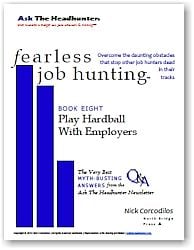In the January 20, 2015 Ask The Headhunter Newsletter, a job seeker interviews for a senior job only to receive a silly offer for a lower level job.
Question
I have not been on the job market since 2007, and after a layoff early October 2014 I am fighting my way through this job market. I have the background, experience, and personality a high tech company was looking for when they advertised a senior technical position at $96,000. After all the interviews, we seemed to be doing great, until my final face to face interview, where I was informed there are now two positions — one senior and one junior. During my initial screening with the company recruiter I was clear on my salary requirements.
When I rec
eived the company’s offer letter, it was for $75,000, way below what we had discussed. I was insulted, shocked, and angry. When I called the recruiter, she stated there were a lot of strong candidates, that there were actually five positions, and that I fit better into a junior role at the salary offered. I replied that I applied for only the senior position at $96,000 and that there was no discussion of four other positions. I asked about the differences between the positions, and it’s clear from what the hiring manager says that there are none but the salary!
I want to send a response letter stating that I was a candidate for only the senior job, re-emphasizing my experience and expertise, and referencing the original senior salary range. What would you recommend?
Nick’s Reply
If you stand a few feet back from this and look at it for what it is, I think you’ll see the proper answer. I’m going to show you how to improve this job offer dramatically, but you must be ready to play this game for keeps.
First let’s do a reality check. This employer is playing you. You laid down the terms for the interview when you (a) applied for a senior technical position, and (b) when you stated your salary requirements and they agreed to proceed with those two understandings.
Now look at the facts:
- They offered you different job
- At a much lower salary.
We could just call this a stupid HR trick, but there’s another name for it: Bait and switch. A car dealer baits you with a test drive in a car you want to buy after you saw the price. You show up with a check, and they offer you a different car at a different price. You’d kick them down the street for switching the deal and wasting your time.
You did what you were supposed to do, so you’re thrown for a bit of a loop. You interviewed for a certain job at a certain salary level. They knew your expectations, and they agreed to proceed with the interviews. Then they changed all the terms and made a ridiculous offer. Had they made no offer, I’d just say the match didn’t work out. But this employer is clearly manipulating applicants. (I find this is most common with staffing firms that hire people and assign them to work for their clients. See Bait & Switch: Games staffing firms play.)
You’re trying to behave rationally, and you’re looking for a reasonable explanation and next step. The recruiter and manager should be trying to impress you — see Baiting the talent — but they are doing the opposite. They are breaking basic business rules and pretending the problem is yours.
But two can play at this, and you can play without doing anything unprofessional. First, you must decide that you are willing to walk away from the junior position at the junior salary. (If you’re desperate for a paycheck, then you know what you must do.)
What I’d do is sign the offer letter and send it back to them. But I’d cross out the salary and enter the salary you told them you wanted. Initial it. Cross out the junior title and write in the senior title you interviewed for. Initial it. Accept the position at the salary level you all discussed. Add a note that says:
“This is the job I applied for and that you interviewed me for, at the salary range we discussed. If you are prepared to sign off on the original terms as we discussed them, I am ready to start work in two weeks.”
Then let them figure it out.
My prediction is that you’ll never hear from them again. However, there’s a chance that, having a solid acceptance in hand, along with a start date, from a candidate they have judged worthy of hiring, they might negotiate a reasonable salary for the job you want. You’ve written your own ticket, and it’s up to them to join you for the ride. If they decline, you’ve lost nothing (having already decided you wouldn’t accept less) and you’ve preserved your integrity and self-respect.
For more about dealing with the final stages of the interview process, see Fearless Job Hunting, Book 9: Be The Master of Job Offers.
If they decline, write them off and move on. These are jerks of the first order and I’d never talk to them again. This is an unscrupulous recruiter who advertises a high-level, desirable job at a high salary to entice seasoned, experienced technical people like you to invest plenty of time in interviews — just so they can short-sell you on a lower-paying job that they’d prefer to fill with much more highly qualified candidates at a huge discount.
 They are con-men. You told me off-line who this company is: one of the biggest, most respected computer companies in the world — but it doesn’t matter. They’re still con-men.
They are con-men. You told me off-line who this company is: one of the biggest, most respected computer companies in the world — but it doesn’t matter. They’re still con-men.
Many, many people in today’s job market would fall for this and rationalize that it’s the best they can do. Maybe so — but when you add in a confidence game, we’re left with a bunch of self-deprecating job seekers who let themselves be suckered. Con-men love that.
I’d be interested to know what you do and what happens. The problem, of course, is that there are desperate job hunters who will accept any job under any terms and at any pay. This employer counts on that. It’s what’s wrong with our economy today: Crooks and suckers. They create a market that can’t last. It can only go south. For more about this, see Employment In America: WTF is going on?
(I mean no disrespect to job seekers who need to put food on the table and who will take any job to do so. I’d do it myself. But the economic reality is that being put in this position creates a vicious downward cycle that encourages more of the same from ruthless employers.)
There is nothing wrong with you or your expectations. If you can afford to walk away from this, I would not look back. Jerks make lousy employers. You need only one employer with integrity.
Did you ever feel pressured to accept a lousy offer for a job you never applied for? What’s the most bizarre job offer situation you’ve been in — and what did you do? Was I too tough on this reader? What would you advise?
: :

















